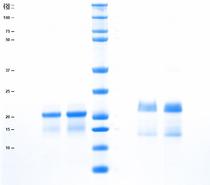
Cathepsin H
Product Sizes
0.025 mg
16-12-030108-0.025MG
0.1 mg
16-12-030108-0.1MG
1 mg
16-12-030108-1MG
About this Product
- SKU:
- 16-12-030108
- Additional Names:
- Cancer, Alzheimer's, Parkinson's, In Vitro Diagnostic|CatH, CTSH
- Buffer:
- Frozen in 20 mM Na Acetate, pH 4.5, with 1 mM EDTA and 100mM NaCl
- CAS Number:
- 9047-22-7
- CE/IVD:
- RUO
- Extra Details:
- Cathepsin H (CatH) is a lysosomal cysteine protease distinguished by its unique dual aminopeptidase and endopeptidase activities. Unlike other cathepsins, it includes a disulfide-linked mini-chain that anchors substrate N-termini via electrostatic interactions, enabling sequential cleavage of N-terminal basic residues (Arg/Lys). This exopeptidase function, optimal at neutral pH, facilitates its role in extracellular spaces, while its endopeptidase activity at acidic pH (4.5-5.5) supports lysosomal protein degradation. Clinically, CatH overexpression correlates with aggressive tumor phenotypes. In colorectal cancer, CatH activity is elevated promoting metastasis via extracellular matrix remodeling. Serum CatH levels >45 ng/mL serve as a prognostic marker for melanoma metastasis and reduced survival. Conversely, decreased CatH in head/neck squamous carcinomas and polycystic kidney disease suggests tissue-specific regulatory roles. In Alzheimer's disease, CatH contributes to amyloid-B Beta plaque formation by cleaving tau and amyloid precursor proteins, while in Parkinson's models, it degrades A Alpha-synuclein aggregates. Therapeutically, CatH's role in neuropeptide processing (e.g., enkephalin and galanin biosynthesis) highlights its potential in pain management and neurodegenerative therapies. Inhibitors targeting its active site (e.g., E-64) reduce tumor invasion in preclinical models, while pH-selective compounds (Z-Arg-NHMec) spare lysosomal functions. Diagnostic applications leverage its elevated expression in gliomas and breast cancers for early detection and stratification. These multifunctional roles position CatH as a critical node in both lysosomal proteostasis and disease pathogenesis.
- Formulation:
- Frozen in 20 mM Na Acetate, pH 4.5, with 1 mM EDTA and 100mM NaCl
- Molecular Weight:
- 28,000 Da
- Physical State:
- Frozen
- Purity:
- Not Listed
- Purification:
- Liquid Chromatography Methods
- Shipping Conditions:
- Dry Ice
- Source:
- Prepared from liver shown to be non reactive for HBsAg, anti-HCV, anti-HBc, and negative for anti-HIV 1 & 2 by FDA-required tests.
- Storage Conditions:
- Please refer to datasheet
- Supplier:
- Athens Bioscience, Inc.
- Type:
- Proteins, Peptides, Small Molecules & Other Biomolecules: Enzymes


